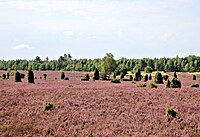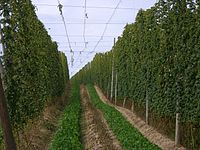Bloenland: Difference between revisions
No edit summary |
(+cat) |
||
| Line 147: | Line 147: | ||
[[Category:Bloenland]] | [[Category:Bloenland]] | ||
[[Category:Countries in East Uletha]] | |||
Latest revision as of 05:36, 2 December 2023

|
Kingdom of Great Blönland Königreich Groß-Blönland (Blönnish Kalmish) Capital: Burgenau
Population: 17.355.500 (2020) Anthem: Blönlandlied |
Loading map... |
Blönland, formally the Kingdom of Great Blönland (Königreich Groß-Blönland) is a country in East Uletha. It borders Remsfalen to the west, Pyokchin and Izaland to the south and Saikyel to the east, as well as the Darcodian Sea to the north. It covers an area of xxx square kilometers and has a population of over xx.x million, resulting in a population density of xxx per square kilometer. It is one of the easternmost culturally and linguistically Kalmish countries. The capital and largest city is Burgenau, located in the south, closely followed by Collenburg near the northern coast. Other major cities are the twin cities Dietfeld and Neustadt an der Lubbe, Papenau, Neustadt auf der Höhe, Daxau and Kronenburg.
A constitutional monarchy ruled by a King, Prime Minister and bicameral parliament, Blönland consists of two Constituent Countries (Länder) - the Kingdom of Blönland proper (Königreich Blönland), with the capital Burgenau and the Grand Duchy of Remsfalen-Lüningen (Großherzogtum Remsfalen-Lüningen), with the capital Collenburg. Historically distinct entities that were gradually unified after they came under a personal union, both have retained large degrees of autonomy and are culturally distinct, speaking different dialects. While Blönland is primarily Catholic, Remsfalen-Lüningen is mostly Protestant, except for areas in its south and east. The forested Central Mountains separate Blönland proper from largely flat Remsfalen-Lüningen, while the southern border is formed by the MOUNTAINRANGENAME.
Overview
WIP
Geography
Administrative Divisions
Main article: Administrative Divisions of Blönland
Cities
Gallery
History
Prehistory
Kalmish colonization and Christianization
County of Blönland
Establishment of the Kingdom and expansion
Lüningish Wars and Unification Era
Great Ulethan War
Late 20th Century
Postwar Recovery
Mountain War
Arctic War Intervention
1976 Nuclear Test Scandal
Christian-Social Coalition
Steinhäusel Scandal
1999 Christmas Agreement
21st Century
Government
Main article: Government of Blönland
According to the current Constitution, the Kingdom of Blönland is a federal constitutional parliamentary monarchy. The current Head of State is King Friedrich-Alexander III, who was born in 1945 and inherited the crown in 1968 upon the death of his father King Georg IV. This position is hereditary and has stayed in the von Burgenau family since the establishment of the Kingdom in 1461. The King resides in the Royal Palace of Burgenau.
The Head of Government is the Prime Minister, who is appointed politically by the King and oversees the Royal Cabinet, the supreme executive body of the Kingdom. The current incumbent, serving his second term since 2020, is Baron Carl Friedrich von Glückuhn, born in 1978.
Characteristics of the Constitution - Federal Constitutional Parliamentary Monarchy
The term "Federal" refers to the fact that the Kingdom consists of two Constituent Countries, Blönland (called Blönland proper to differentiate it from the Kingdom as a whole) and Remsfalen-Lüningen. The latter, formerly a Grand Duchy ruled by a cadet branch of the Remsfalian royal house until it died out prompting the King of Blönland to raise a claim, was integrated into Blönland in a process that begun with the 1st and 2nd Remsfalian Wars and lasted well into the 20th century. Since 1952, both Constituent Countries are equally autonomous and share one common bicameral parliament which is supplemented by two regional legislatures that have limited but equal rights.
The term "Constitutional" signifies that the Constitution limits the powers of the King and all other organs of the Government and enforces a strict separation of the three powers. The Constitution stipulates that the Rule of Law is supreme in Blönland, guarantees basic rights and obligations of citizens and the form of government.
The term "Parliamentary" is a reference to the role of the legislature, which alone can pass new laws and change the Constitution. Since 1952, the legislature of Blönland is the United Diet (Vereinigter Landtag), which consists of two chambers, the House of Lords (Herrenhaus) and House of Representatives (Abgeordnetenhaus) which both play an active role in the legislative process. The House of Representatives is elected in a first-past-the-post system, currently consisting of 284 seats all representing a single electoral district. The map is redrawn regularly and districts are split or merged in accordance with changes in the proportion of the population between Blönland proper and Remsfalen-Lüningen. The House of Lords, capped at 150 seats, is not elected and supposed to serve as a nonpartisan counterweight to the House of Representatives and other democratic bodies. It consists of members appointed by the King, "presented" by certain public bodies according to a set key, the highest bishops of both churches and hereditary members.
The term "Monarchy" implies that there is only one, singular Head of State and that all powers and functions of the State, even though they are separated and delegated, emanate from him. The King serves as the highest representative of Blönland, personifies the nation and "supervises all functions of the Kingdom, its government, legislature, courts, organs and bodies and those of its subdivisions" according to the Constitution. While his obligations are mostly representative and ceremonial, the King has more prerogatives than in most other countries and unlike many other monarchs the King chooses to actively influence the political process. The King must stand above all parties but is entitled and expected to pursue his own vision of betterment for Blönland. No law may come into force without the King's signature, and death and long prison sentences must be approved by him.
United Diet
House of Lords
48 of its members are appointed for life by the King, 41 are "presented" by public bodies including universities, landowners' assemblies and the military according to a set key, 11 belong to the House by virtue of their office as Catholic or Protestant Bishops and 50 hold hereditary seats.
House of Representatives
Economy
Main article: Economy of Blönland
Blönland maintains a strong agricultural base which is complemented with industries such as automotive and defense production. Since the 1980s, the government sought to centralize production by promoting business parks outside cities and near motorways, often creating favorable road and railway accesses.
 | |
|---|---|
| Economy of Blönland | |
| mixed | |
| Currency | Blönland Crown (Blönländische Krone) - 1 BKr = 100 S (Schilling). |
| Monetary authority | Blönland National Bank (Blönländische Landesbank) |
| HDI () | very high |
| Unemployment rate | 3.5% |
| Principal exports | Grains, dairy, wood |
| Principal imports | Coal, oil, ores, metals |
| (custom label that appears in bold on the left side of the infobox) | (custom information that is defined by custom_label1) |
| (custom label that appears in bold on the left side of the infobox) | (custom information that is defined by custom_label1) |
The tertiary sector begun rapidly developing after the fall of the Social-Democratic Coalition and most international banks, except for those associated with Izaland, maintain a presence in Burgenau and in Collenburg, attracting both ambitious climbers from Blönland's middle classes and expats from other parts of Uletha.
Infrastructure
Main article: Infrastructure in Blönland
Culture
Main article: Culture of Blönland


















